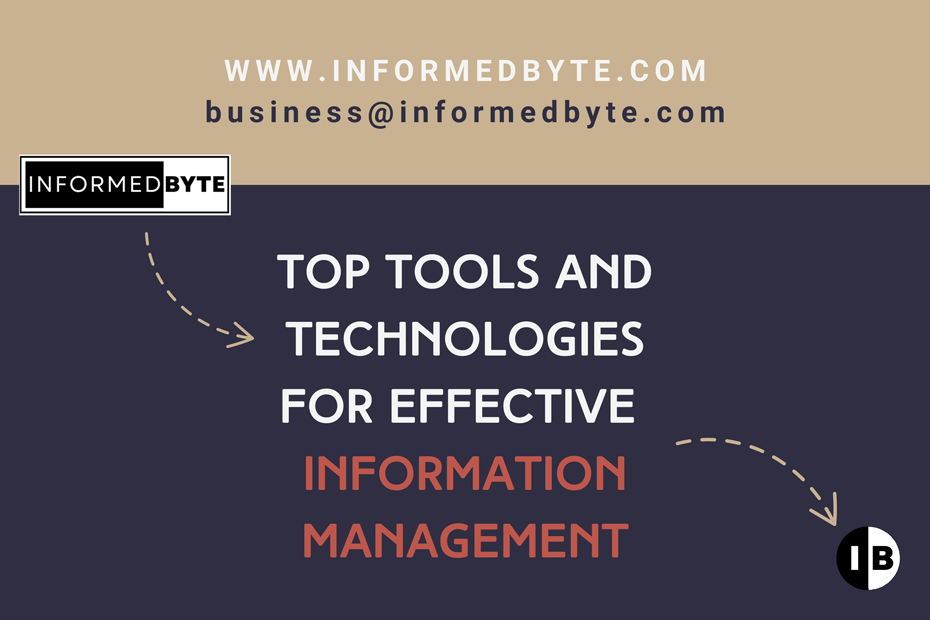Top Tools and Technologies for Effective Information Management
April 1, 2025
In today's fast-paced business environment, effective information management is crucial for maintaining a competitive edge. As a business professional, you understand the importance of leveraging advanced tools and technologies to manage your organisation's information assets efficiently. We will explore various systems and technologies, including Digital Asset Management Systems (DAMS), Library Management Systems (LMS), Integrated Library Systems (ILS), Collection Management Systems (CMS), Media Asset Management Systems (MAMS), Product Information Systems (PIMS), Customer Relationship Management (CRM), and digital preservation. Additionally, we will discuss the benefits of expert consulting and managed services for information management.

Image credit by Headway on Unsplash
Digital Asset Management Systems (DAMS)
Digital Asset Management Systems (DAMS) are essential for organisations that deal with a large volume of digital content. These systems provide a centralised repository for storing, organising, and retrieving digital assets such as images, videos, documents, and other multimedia files. By implementing a DAMS, you can ensure that your digital assets are easily accessible, secure, and properly managed. Key features of DAMS include metadata tagging, version control, and user permissions, which help streamline workflows and improve collaboration among team members.
Library Management Systems (LMS) and Integrated Library Systems (ILS)
Library Management Systems (LMS) and Integrated Library Systems (ILS) are designed to manage the operations of libraries and information centres. These systems automate various library functions, such as cataloguing, circulation, acquisition, and inventory management. By using an LMS or ILS, you can enhance the efficiency of your library operations, reduce manual tasks, and provide better services to your users. These systems also support integration with other information management tools, enabling seamless data exchange and interoperability.
Collection Management Systems (CMS)
Collection Management Systems (CMS) are used by museums, archives, and cultural institutions to manage their collections. These systems help you catalogue, track, and preserve valuable artifacts and objects. A CMS provides tools for documenting provenance, condition reports, and conservation activities, ensuring that your collections are well-maintained and accessible for research and exhibition purposes. By implementing a CMS, you can improve the management of your collections and enhance the overall visitor experience.
Media Asset Management Systems (MAMS)
Media Asset Management Systems (MAMS) are specialised tools for managing media content, such as audio, video, and graphics. These systems are particularly useful for organisations in the media and entertainment industry, where large volumes of media assets need to be stored, organised, and distributed. MAMS offer features such as transcoding, metadata management, and content distribution, enabling you to streamline your media workflows and ensure that your content is delivered to the right audience at the right time.
Product Information Systems (PIMS)
Product Information Systems (PIMS) are designed to manage and centralise product data across an organisation. These systems help you maintain accurate and consistent product information, which is essential for effective marketing, sales, and customer service. PIMS provide tools for data enrichment, validation, and synchronisation, ensuring that your product information is up-to-date and reliable. By implementing a PIMS, you can improve the efficiency of your product management processes and enhance the overall customer experience.
Customer Relationship Management (CRM)
Customer Relationship Management (CRM) systems are vital for managing interactions with customers and prospects. These systems help you track customer data, manage sales pipelines, and automate marketing campaigns. By using a CRM, you can gain valuable insights into customer behaviour, improve customer engagement, and drive sales growth. CRM systems also support integration with other business tools, enabling you to create a unified view of your customer data and streamline your business processes.
Digital Preservation
Digital preservation is the process of maintaining and protecting digital content over time. This is particularly important for organisations that need to preserve valuable digital assets, such as historical records, research data, and cultural heritage materials. Digital preservation involves the use of specialised tools and techniques to ensure that digital content remains accessible and usable in the long term. By implementing digital preservation strategies, you can safeguard your organisation's digital assets and ensure their longevity.
Expert Consulting and Managed Services
To maximise the benefits of these information management tools and technologies, it is essential to leverage expert consulting and managed services. Expert consultants can help you assess your organisation's information management needs, recommend the most suitable tools and technologies, and develop customised solutions to address your specific requirements. Managed services providers can offer ongoing support and maintenance, ensuring that your information management systems are always up-to-date and functioning optimally.
Informed Byte Expert Consulting and Managed Services
By partnering with Informed Byte as an expert consultancy and managed services provider, you will gain access to specialised knowledge and expertise, reduce the burden on your internal IT resources, and focus on your core business activities. This is a that will ensure your information management strategies remain effective and relevant.
Schedule your consultation
